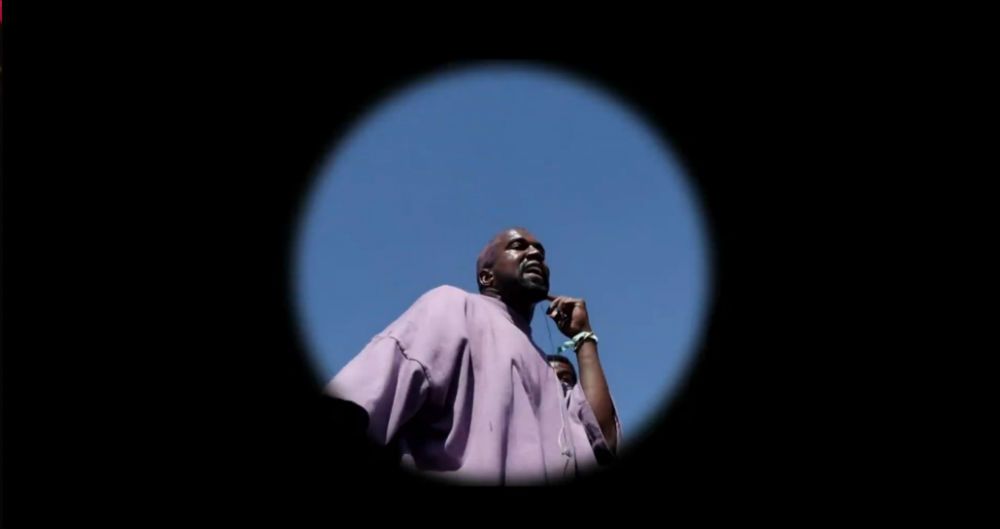The False Promises of Jesus Is King
The Movie On Wednesday, October 30th, I watched Kanye West’s Jesus Is King in the Providence Place IMAX theater. Although it was the middle of the week, I thought it would be more crowded, since Jesus Is King was only at the theater for 3 days,...
The Movie
On Wednesday, October 30th, I watched Kanye West’s Jesus Is King in the Providence Place IMAX theater. Although it was the middle of the week, I thought it would be more crowded, since Jesus Is King was only at the theater for 3 days, with only two shows each day. Yet, there were only 7 people inside of the theater, including myself. The movie screen was huge, and the sound was booming, all in an effort to try to reproduce the sensation one feels when listening to beautiful voices and sounds in harmony, I would guess. The giant screen and booming sound sucked me in as the music enveloped the empty theater — I shivered as the choir sang. West has been influenced by gospel music throughout his career, but now he is after something different. Instead of just a choir, an organ or some Scripture, there is a spiritual connection the singers feel to their words, to the gospel they preach. This connection was powerful enough to understand that this is what Kanye wants. Their sound creates something transcendent, and that’s all he needs. Towards the end of the movie the Sunday Service choir chants praises. People cry out to God. “Hallelujah!” people sing. All of the choir’s songs have been emotionally stirring, but this time, as the choir sings, Kanye West appears for the first time in the film — but he is not singing. He is just watching, bobbing his head. There is a gap between him and the singers, and it’s all the more curious when the choir finishes. People are so rapt in the overflowing spirit that many of the singers break down and cry, hugging the people near them. I was detached from them, and Kanye was too. Someone comes up to hug Kanye, and he accepts, but he looks distant. He was moved, just as we were. After everyone leaves, the movie cuts to Kanye singing a gospel version of his 2008 song “Street Lights.” It’s his attempt to recreate this feeling, a spiritual community through sound and a oneness with God. On this song, he comes closer than I would have imagined. It’s beautiful, sweet, and near endearing be. After about 26 minutes, the movie was over, and I exited into a world where the Kanye West I heard on his album Jesus is King was different than the Kanye West I saw in the movie Jesus is King. The Album Jesus Is King, the album, is fine. It sounds pretty, but it does not come close to what I thought his ambition was in the movie: to connect to God by opening himself up to Him, to understand a spiritual feeling so great that it allows him to literally not need anything else. Kanye tries to achieve this on songs like “Everything We Need” and “Water.” On the former, he employs a “No Flockin” flow to tell us that we need to switch our attitude — which honestly feels a bit condescending. On the latter, he asks for Jesus to “clean the music,” feeding into long existing narratives about rap music promoting violent, sinful lifestyles as opposed to simply portraying artful, mythical versions of a harsh reality. When he says lines like, “”How you get so much favor on your side?”/”Accept Him as your Lord and Savior, I replied,”” it feels like he’s saying what he thinks he should say in order to appeal to some ideal Christian. This isn’t always the case: on “God Is,” and “Follow God,” he is honest with himself in a way that is quite beautiful. He spends much of the album defending himself, saying that he’s really changed. In a way, he is still living in the realm of reactionary thought; I get the sense that he is trying to be a spiritual person not because he wants to be, but because people tell him that he cannot be one. When I saw the movie Jesus Is King, I had seen something that the album largely did not tell me. The movie told me that Kanye West was so awestruck by this choir that he was inspired to replicate the spiritual magic of gospel. In doing so, Kanye would examine more of himself too. He would dive into reckoning with his weaknesses, living inside them and being at ease. He’s done this before, a lot. It’s part of why I was such a fan of his music for such a long time. It’s not just the lyrics, either; the sounds and samples of some of his past songs were so evocative. The Old Kanye I remember being obsessed with his song “Late,” a bonus track off of Late Registration. The song is literally “late,” because it doesn’t make it onto the album, and he spends the whole song riffing about how he is late for class registration and talking about how he’s in the basket-weaving class instead. “Will I make it from the student loans to a Benzo/Like old folks pissing I guess it all Depends oh,” he says, delivering a crude but clever line illustrating not just his sense of humor, but the amount of chance and uncertainty there is in his world. He’s talented, but will he “make it”? Who knows, and attributing success to hard work is naive. The lyrics are fun and reflective, and West knows his audience is small at this point. This is a bonus track, after all. The sample, “I’ll Erase Your Pain” by the Whatnauts (from Baltimore!), makes this song a gem. The chorus of “Late,” “I’ll be late for that…” seemingly mirrors the sample exactly. Even though “Late” says “I’ll be late for that,” the actual song is “I’ll erase away..” The top comment on Late’s Genius page notes that the sample also sounds like “Cause I be Mr. West,” and gives the song a sense of flexibility and ambiguity that I’ve rarely ever heard. The song sounds different every time you hear it, from the words to the sample and even to the lilting violins at the beginning. The most prominent example of West’s funhouse mirror samples comes from one of his most famous songs, “Through the Wire,” and its sample “Through the Fire.” Another great example is “Players” by Slum Village and its sample “Clair.” Jesus Is King is not flexible, or even trying to be, and there is a paucity of moving lyrics and sounds. You would expect a gospel album to try to convert you, but there is little that truly draws the listener in. It may be the first Kanye West album that is best served as background music — gospel lo-fi. The New Kanye? I would be more engaged in this phase of West’s life if it wasn’t for what pervades this music, consciously or not. He does not live in a world where his posturing for God occurs in a vacuum. Donald Trump Jr. specifically has said the album was “the epitome of fearless creativity.” He then said in the same tweet that Kanye is “speaking truth.”Kanye has also said that this album is in response to an increasing secularization of American education. Trump Jr.’s father appointed Betsy Devos, who has said she wants to “confront the culture in ways that will continue to advance God’s kingdom.” This exactly aligns with West’s current views on education. However, Devos has instituted reforms that have been disastrous for millions of Americans. She has deregulated for-profit universities, allowing for the rebirth of colleges that rely on low-income Pell Grant students and give them large amounts of student debt without an improvement in job prospects, as well as trying to shut down a loan forgiveness program for public servants. All this does is continue to narrow the ways to “make it,” to decrease the chances to have a nice house, to have the “Benzo,” or even to have reasonable financial security. Kanye knew the hell of student loans, and it was part of the reason he railed against higher education for so long. It is upsetting that people equate Christian faith in schools with for-profit colleges and denial of loan forgiveness, but it seems as if Devos and other administrators have chosen to make these important policy directives. I hope Kanye can continue to find peace within himself. There are glimpses in the movie and the album of something fresh and relaxed breaking through, but that person is still emerging. In the meantime, his co-opted messaging has only further justified ideas like “stopping Christianity from being taken out of our schools” or making music “clean” again. These messages seem innocuous enough, but these ideas are justifying policies which keep low-income young people in debt as well as allowing for more rounds of debate asking if rap music promotes and normalizes violence. As long as Kanye is advocating for change that keeps people in debt and that demonizes an entire genre of music he has long championed, there will be a dispiriting element to his music that I can never entirely shake off.Kanye West is cracking the culture code.@kanyewest’s new album #JesusIsKing is the epitome of fearless creativity and “dangerous, unapproved” ideas.
— Donald Trump Jr. (@DonaldJTrumpJr) October 29, 2019
Leftists always try to silence those who are speaking truth. They’re waging a war on our family and culture.
Kanye is a pioneer pic.twitter.com/EmPgLqgGZJ

